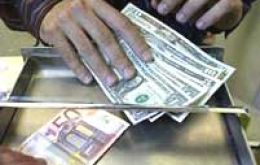MercoPress. South Atlantic News Agency
Economy
-
Thursday, September 27th 2007 - 21:00 UTC
Winnie the Pooh to keep reaping millions for Disney Group

Winnie the Pooh, the honey loving bear at the heart of a royalty's lawsuit, can continue to reap millions for Disney, a Los Angeles appeals court ruled this week, tossing out the latest challenge to a disputed, lucrative contract.
-
Thursday, September 27th 2007 - 21:00 UTC
Fallout from global financial turbulences finds Chile strong
After the International Monetary Fund (IMF) announced that the economic crisis in the United States has not yet peaked, Chile's Minister of Finance Andres Velasco assured government officials this week Chile is prepared for economic turbulence.
-
Wednesday, September 26th 2007 - 21:00 UTC
IMF: markets are moving towards normalization

The liquidity crisis on global financial markets is easing and most of the world will emerge unscathed, with the exception of the United States, IMF Managing Director Rodrigo Rato said on Tuesday.
-
Wednesday, September 26th 2007 - 21:00 UTC
Falklands: Kirchner blasts British “obstinacy” in the UN

British “obstinate reluctance” to dialogue with Argentina over the Falkland Islands sovereignty is “incompressible” said Argentine President Nestor Kirchner on Tuesday in his address to the United Nations General Assembly.
-
Wednesday, September 26th 2007 - 21:00 UTC
Unprecedented drop in world oilseeds crops forecasted

World production of the top ten oilseeds is forecasted to register an unprecedented fall this season because of bad weather conditions during growth, according to Hamburg-based Oil World.
-
Wednesday, September 26th 2007 - 21:00 UTC
Two confronted visions on Latinamerica economic prospects
Dissenting views on Latinamerica future and economic prospects proved most evident during a recent Conference on the Americas sponsored by The Miami Herald and which gathered top government officials, economists and corporate leaders.
-
Sunday, September 23rd 2007 - 21:00 UTC
Farm Bill to determine WTO talks progress

Fresh ideas are circulating in renewed World Trade Organisation (WTO) talks on farming tariffs and subsidies, two of the biggest roadblocks to a new accord on boosting global trade flows, the talks chairman said on Friday.
-
Thursday, September 20th 2007 - 21:00 UTC
Blaze Destroys Chilean Hotel, Casino

A devastating fire ripped through a hotel and casino Monday morning in the southern town of Pucon. The five-star resort complex, which hosts Hotel of the Lake and the Enjoy Casino, was consumed by flames after a short circuit in the casino's electrical system.
-
Thursday, September 20th 2007 - 21:00 UTC
Dollar falls to new low vs euro breaking $1.40

The US dollar hit a new record low against the euro as investors sold the currency after the Federal Reserve's hefty interest rate cut.
-
Thursday, September 20th 2007 - 21:00 UTC
United States embargo has cost Cuba US$89B

Washington's 45-year-old embargo has cost Cuba more than US$89 billion to date, wreaking havoc on everything from primary education to pest control and nearly all other facets of island life, the foreign minister said Tuesday
